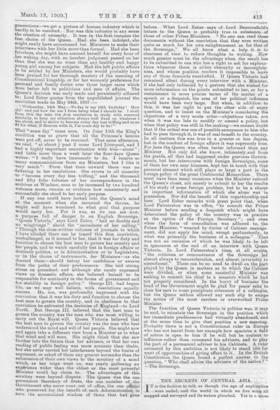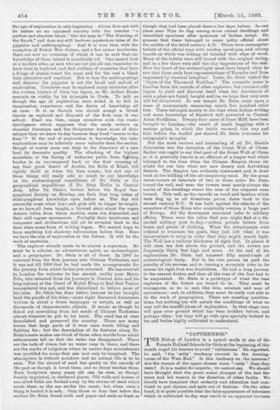THE, $ECRETS OF ,CENTRAL , ASIA.
TT is the fashion to talk as though the age of exploration : were ended; and the world in which we live war", ail mapped and surveyed and its waters plumbed. Yet in a souse
the age of exploration is only beginning. Africa does not still lie before us an untamed country with the interior "a perfeet and absolute blank," like the map in "The Hunting of the Smirk," and does not still harbour mysterious tales of its pygmies and anthropophagi. And it is true that, with the exception of Dutch New Guinea, and a few minor territories, there are now no countries of which it can be said that our knowledge of them inland is practically nil, One cannot look at a modern atlas, as men who are not yet old can remember to have done in boyhood, and find outlines of countries that have a fringe of names round the coast and for the rest a blank both attractive and repellent. But to face the anthropophagi and discover the pygmies is not the be-all and end-all of exploration. Countries may be explored many centuriee after the written history of them has begun, as Mr. Arthur Evans reminds us vividly by his triumphs in Crete. To talk as though the age of exploration were ended is to fail in imagination, experience, and the desire of knowledge all at once. It is as though one should accept a Greek classics as explored and disposed of the first . time it was edited. Shall we, then, range ourselves with the rustic intelligences which supposes that the early writers on classical literature and the Scriptures knew more of their subject than we know to-day because they lived "nearer to the time" P If the end of exploration is knowledge, the later explorations may be infinitely more valuable than the earlier, though of course none can deny to the discovery of a new land its dramatic quality. The climbing of the highest mountain, or the facing of unknown perils from fighting hordes in an unconquered laud, or the first crossing of, say, that great desert of Arabia, the Robe el Khali, will rightly thrill us when the time comes ; but not one of these things will really add so much to our knowledge as the archaeological expeditions of Dr. Stein or the geographical expeditions of Dr. Sven Hedin in Central Asia, After Dr. Stein's lecture before the Royal Geo- graphical Society on Monday, one feels that long vistas of ethnographical knowledge open before us. The day will assuredly come when boys and girls will no longer be taught, as we have all been taught, a blurred story about the vague Asiatic tribes from whom modern races are descended, and their still vaguer movements. Probably their territories and conquests and civilisations will all be revealed back to the time when some form of writing began. We cannot hope to have anything but shadowy information before that. Here we have the aim of exploration in the future. It will be the work of centuries.
The explorer already needs to be almost a superman. He must be a. scholar, an adventurous spirit, an archaeologist, and a geographer. Dr. Stein is all of these. In 1901 he returned from his first journey into Chinese Turkestan, and it was not till 1906 that he had made the arrangements for the journey from which lie has just returned. He has received in London the welcome he has earned, unlike poor Marco Polo, who returned from his journeys in Central Asia and his long sojourn at the Court of Kubla Khan to find that Venice remembered him zot, and was disinclined to believe most of his tales. Dr. Stein has done better, because he has brought back the.proofs of his tales,—some eight thousand documents written in about a dozen languages or scripts, as well as thousands of characteristic objects. it seems as though he fished out something from the sands of Chinese Turkestan almost wherever he put in his hand. The sand has at once demolished and preserved the country. There are many traces that large parts of it were once worth tilling and fighting for ; but the description of its features along Dr. Stein's route makes one think of those other worlds from which astronomers tell us that the water has disappeared. There are the beds of rivers, but no water runs in them, and there are the marks of irrigation where in earlier days nourishment was provided for crops that can now only he imagined. The atmosphere is without moisture and no animal life is to be seen. Yet the shroud of sand lies gently on the records of the past as though it loved them, and no decay reaches them. Even footprints many years old can be seen, as though freshly imprinted, in sheltered places. Old walls and houses of sun-dried brick are fretted away by the storms of sand which erode them as the sea erodes the coast; but when once a thing is buried it is safe. Only three or four feet below the surface Dr. Stein found cloth and paper and seals as fresh as though they bad been placed there a few days before. In one place near Niya he dug among some ruined dwellings and unearthed specimen after specimen of Indian script. He guesses that these belonged to some petty official about the middle of the third century A.D. There were rectangular tablets of the official type with wooden envelopes, and oblong boards on which was writing all labelled with slips of wood. Many of the tablets were still bound with the original string, and on a few there were still the clay impressions of the seal. How the heart of the archaeologist must have leaped when he saw that these seals bore representations of Heracles and Eras impressed by classical intaglios ! Later, Dr. Stein visited the "Caves of the Thousand Buddhas." The romantic name is familiar from the records of other explorers, but romance only begins to yield and discover itself when the documents of such a place are found, bought, and (as we hope they very soon will be) deciphered. In one temple Dr. Stein came upon a mass of manuscripts measuring nearly five hundred cubic feet. These belonged mostly to the time when Indian writing and some knowledge of Sanskrit etill prevailed in Central Asian Buddhism. Twenty-four cases of these MSS. have been brought to • London,—the result of much haggling with a zealous priest, in which the battle wavered this way and that before the tactful yet shrewd Dr. Stein overcame hie antagonist's scruples.
But the most curious and interesting of all Dr, Stein's discoveries was the extension of the Great Wall of China. Rather one ought to say that part of the Great Wall of China as it is generally known is an offshoot of a longer wall which belonged to the time when the Chinese Empire threw its might far out into what are now dreary and forbidding deserts. The Empire has evidently contracted, and it drew back at the bidding of the all-conquering sand. By the great watch-towers at intervals of two or three miles Dr. Stein traced the wall, and near the towers were nearly always the mark!' of the dwellings where the men of the outposts were housed. This wall, as the records on wood and bamboo which were dug up in all directions prove, dates back to the second century B.O. It was built against the attacks of the ancestors of those Huns who eventually overran a large part of Europe. All the documents recovered refer to military affairs. There were the relies that you might find at a die. carded military post to-day,—orders, private letters from home, and pieces of clothing. When the detachments wens ordered to evacuate the posts, they just left what it was inconvenient to carry in order that they might march light. The Wall has a uniform thickness of eight feet. In places it still rises ten feet above the ground, and the towers are frequently thirty feet high and more. At the end of his explorations Dr. Stein had amassed fifty camel-loads of archaeological booty. But in his own person he paid the penalty of his success, and in tracing a mountain river to its source his right foot was frostbitten. He had a long journey to the nearest doctor, and then all the toes of the foot bad to be amputated. Dr. Stein is a prototype of what the best explorers of the future are bound to be. They must be courageous, as he is, and, like him, scholars and men of enthusiasm ; and, in addition, they must be ready and able to do the work of geographers. These are exacting qualifica- tions, but nothing less will satisfy the conditions of what we may call the second phase of exploration. In that stage men will pass over ground which has been trodden before, and perhaps often ; but they will go with eyes specially trained to see and brains highly cultivated to understand.







































 Previous page
Previous page